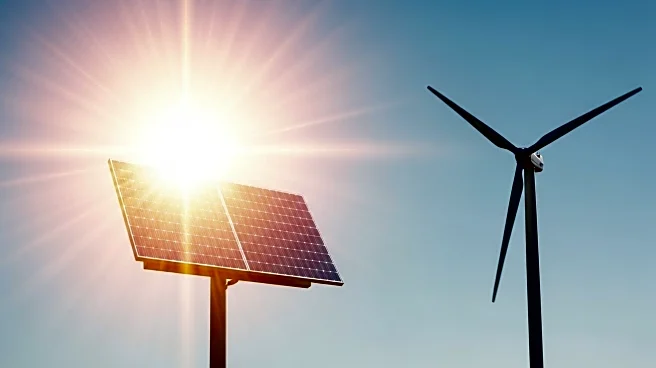What is the story about?
What's Happening?
Rebecca Solnit, a writer and activist, has emphasized the remarkable advancements in renewable energy, describing the transition as 'astonishing.' In her editorial, Solnit argues that renewable energy is now capable of meeting nearly all energy needs, marking a significant shift from fossil fuels. She highlights the need to reduce reliance on fossil fuels, which she identifies as a primary driver of climate chaos. Solnit calls for increased visibility and advocacy for renewables, suggesting that making them more prominent in everyday life could enhance public enthusiasm. She also notes the historical challenges faced by renewables, such as high costs and limited visibility, which have now largely been overcome. Solnit's perspective is that the transition to renewables is not only underway but also unstoppable, offering a cleaner and more sustainable energy future.
Why It's Important?
The shift towards renewable energy has significant implications for the U.S. and global energy landscape. As renewables become more cost-effective and widespread, they offer a viable alternative to fossil fuels, which are associated with environmental degradation and geopolitical tensions. This transition could lead to energy independence, reduce carbon emissions, and mitigate climate change impacts. The economic benefits include job creation in the renewable sector and reduced energy costs for consumers. However, the transition also poses challenges, such as the need for infrastructure development and overcoming political resistance. Solnit's call for increased advocacy highlights the importance of public support in driving policy changes and accelerating the adoption of clean energy solutions.
What's Next?
The future of renewable energy will likely involve continued technological advancements and policy support to further reduce costs and increase adoption. Stakeholders, including governments, businesses, and civil society, will need to collaborate to expand infrastructure, such as transmission lines, and promote energy independence. Public protests and advocacy could play a crucial role in influencing political decisions and ensuring that renewables remain a priority. As the transition progresses, there may be increased focus on energy justice and democracy, ensuring that the benefits of clean energy are equitably distributed.
Beyond the Headlines
The renewable energy revolution also raises ethical and cultural questions about the role of energy in society. As Solnit suggests, the transition offers an opportunity to rethink energy systems and promote more equitable and sustainable practices. This shift could challenge the dominance of for-profit utilities and fossil fuel industries, leading to a more decentralized and community-focused energy model. The cultural shift towards valuing sustainability and environmental stewardship could have long-term impacts on consumer behavior and societal values.















